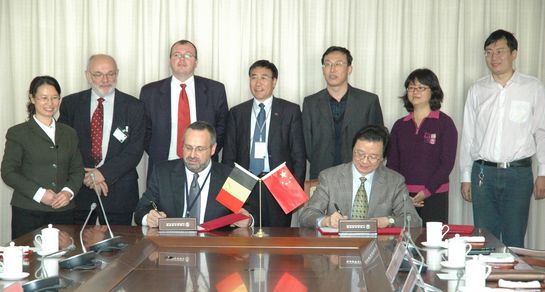
Source: CAAS Quarterly Newsletter
In November 2013, the Vice Minister of Agriculture and CAAS President Li Jiayang and his team paid a visit to the VIB (the Flanders Institute for Biotechnology) and Ghent University. Li signed a memorandum of understanding with Ghent University, aimed at enhancing cooperation with the university in the fields of animal veterinary science, remote sensing for agriculture, soil ecology and biotechnology, and capacity building. The two sides also reached consensus on building a joint laboratory. It was the third science and technology cooperation deal that CAAS has reached with Belgian research institutes or universities, following agreements with CODA-CERVA (Veterinary and Agrochemical Research Centre) and University of Liège.
In this March, in the witness of Chinese President Xi Jinping and Belgian Prime Minister Elio Di Rupo, CAAS and Ghent University signed the ‘Agreement on Setting up a Joint Laboratory on Global Changes and Food Security’ at Egmont Palace, Brussels. The Chinese Ambassador to Belgium Liao Liqiang, entrusted by the Ministry of Agriculture, signed the documents. It will be the first overseas joint laboratory CAAS has ever set up in Europe. The signing, marking a new stage in the science and technology cooperation between CAAS and Belgium.
CAAS and Belgium’s cooperation in agricultural science and technology has entered a new phase. CAAS will enhance pragmatic cooperation with Belgium with the support, and under the guidance, of its superior departments including the Ministry of Science and Technology (MOST), the Ministry of Agriculture (MOA) and the National Natural Science Foundation of China (NSFC). Cooperation will include, but is not limited to, carrying out the project, convening and participating in meetings and activities related to agriculture, jointly applying for EU programs and promoting the transfer of agricultural technology. By making full use of CAAS and Belgium’s research experiences and results, the two sides will deepen cooperation in animal veterinary science, remote sensing for agriculture and agricultural ecology, and accelerate application and industrialization of scientific research findings.
Cooperation between CAAS and Belgium began in the 1980s. The two sides have jointly carried out more than 10 research projects and accomplished tangible results, generating significant economic and social benefits, statistics showed.
For example, at the former Soil and Fertilizer Institute, now known as the Institute of Agricultural Resources and Regional Planning (IARRP), Belgium helped build the first soil physics laboratory of CAAS and set up the China-Belgium Dryland Agricultural Experiment Station in Luoyang, central China’s Henan Province.
Chinese and Belgian scientists have also joined hands in tackling the problem of nutrient loss caused by soil erosion in northern China’s Loess Plateau areas. They worked out a technical system for effective and sustainable farming suitable for the southeastern areas of the Loess Plateau, particularly for the western parts of Henan province, and improved the efficiency of using rainfall and fertilizer. Mature technologies obtained from the research aroused great interest from local farmers around the experimental area. China Central Television also reported the event in its news program.
Another example was the China-Belgium cooperative project: Theory and Practice for the Sustainable Use of China’s Land Resources. The project established an assessment system for the sustainable use of land resources, and the researchers made systematic evaluations of the sustainability of China’s land use at the time, winning the second prize in Beijing’s Science and Technology Awards. Textbooks and teaching plans compiled by the research team were adopted by vocational education institutions in China’s rural areas. The researchers from CAAS and Belgium also co-authored 35 theses and seven treatises for international publications.
Moreover, CAAS and Belgium made remarkable achievements in improving research capabilities. During implementation of the research project – Enhance Soil and Water Conservation of Slope Farmland in Arid Regions – which was jointly carried out by the Institute of Agricultural Resources and Regional Planning, CAAS and Ghent University of Belgium, CAAS invited more than 30 Belgian experts to China and sent 10 Chinese experts to Belgium on long-, medium- and short-term academic exchange trips, and trained 12 master’s or Ph.D. candidates.
The Institute of Plant Protection (IPP), CAAS and the University of Liège cooperated in research on wheat and vegetable aphids and the prevention of aphid-transmitted viruses, with 50-plus theses published or planned to be published and more than ten graduate students sent to Belgium to join the research. Based on this project and approved by the Ministry of Education, CAAS and Belgium’s University of Liège reached a deal on a joint Ph.D. program on agronomy and biotechnology, which aimed to enhance academic and personnel exchanges through the joint education of Ph.D. students. It was also the first international joint education program at CAAS, helping its graduate education to go international at a faster pace. The first batch of 18 students to enroll in the program started their studies in 2013.
Eric Van Ranst of Ghent University won the Chinese Government Friendship Award for 2012 for his outstanding contributions to China-Belgium agricultural science and technology cooperation.
